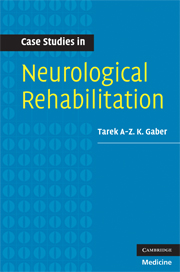Book contents
- Frontmatter
- Contents
- Preface
- Part I Clinical rehabilitation
- Part II Case studies
- 3 Medical issues in brain injury rehabilitation
- 4 Progressive neurological disorders
- 5 Medical complications of immobility
- 6 Orthotics in neurological rehabilitation
- 7 Ethical and medicolegal controversies
- 8 Chronic pain
- 9 Medically unexplained disorders
- 10 Spasticity management
- 11 Ventilatory support in rehabilitation
- 12 Sphincteric dysfunction
- 13 Communication disabilities
- 14 Sensory disability
- 15 Prescriptions for independence
- Part III Exercises in neurological rehabilitation
- Index
8 - Chronic pain
from Part II - Case studies
Published online by Cambridge University Press: 13 August 2009
- Frontmatter
- Contents
- Preface
- Part I Clinical rehabilitation
- Part II Case studies
- 3 Medical issues in brain injury rehabilitation
- 4 Progressive neurological disorders
- 5 Medical complications of immobility
- 6 Orthotics in neurological rehabilitation
- 7 Ethical and medicolegal controversies
- 8 Chronic pain
- 9 Medically unexplained disorders
- 10 Spasticity management
- 11 Ventilatory support in rehabilitation
- 12 Sphincteric dysfunction
- 13 Communication disabilities
- 14 Sensory disability
- 15 Prescriptions for independence
- Part III Exercises in neurological rehabilitation
- Index
Summary
Pain is a common problem in neurologically impaired patients. Establishing the cause of pain should not be the only objective of clinical assessment. The severity of pain and its impact on the patient's life are important as they present the clinician with the best tools to monitor the effects of the management plan. Rating the severity of pain using a scale of 1 to 10 is a simple severity measurement tool. Questions regarding sleep pattern or mood can provide a basic indication of the influence pain is having on the patient's life and will enable the clinician to integrate different strategies into the standard medical management to try to maintain the patient's activities. Sleep is very important, and following a good sleep hygiene can in itself improve the overall picture.
Chronic pain is strongly associated with the patient's mood and beliefs. Some services will have access to cognitive–behavioural therapy, which will be a valuable component of the overall management plan. For immobile patients, postural abnormalities often accentuate pain, especially spinal and lower limb pain. Physiotherapy assessment may be needed to exclude such problems in selected patients.
Establishing the prognosis is an important component of the clinical assessment. Conditions such as painful spasms or restless leg syndrome can be adequately controlled in many patients. Patients with neuropathic pain or spinal pain respond less favourably to treatment, and a discussion with the patient before commencement of therapy should focus on discussing the patient's expectations and encouraging a realistic view of what can be achieved.
- Type
- Chapter
- Information
- Case Studies in Neurological Rehabilitation , pp. 91 - 100Publisher: Cambridge University PressPrint publication year: 2008

